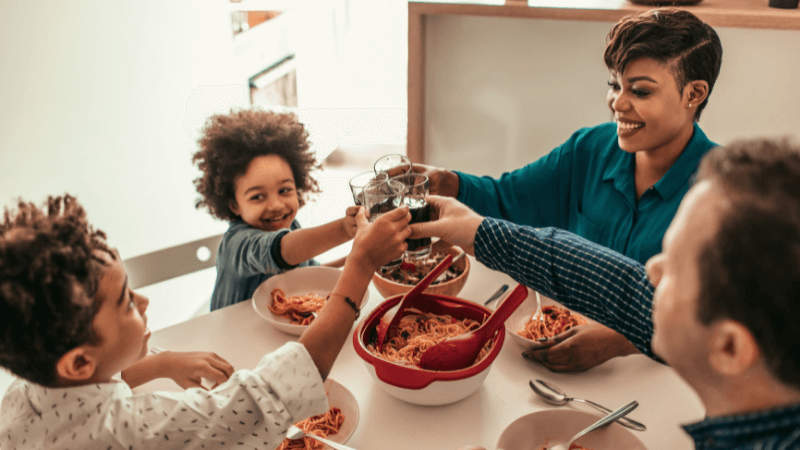As parents, we find that it can be challenging to simply find our own personal space to pause, breathe, and be. Taking the next step––bringing mindfulness practices of kindness and presence into family life––can at times feel nearly impossible.
We’re here to tell you, it can be done.

Here we share activities and tips for bringing mindfulness to the heart of family life––the dinner table. These tips are gleaned from our own parenting experience as well as our more than ten years of developing and teaching mindfulness to families (the IMCW Family Mindfulness Program).
Mindfulness in family life offers us a rich opportunity to practice presence and kindness in our relationships with others, adding frequent doses of forgiveness along the way. As parents, many of us are naturally eager to pass on the benefits of mindfulness to our children. Yet as we all have likely experienced, the ways we as adults access presence and kindness––such as by practicing mindful walking or sitting––often do not translate well for children! As teachers of family mindfulness, we frequently ask ourselves––and share creative solutions around––this question: what can mindfulness look like in family life?
Four Mindful Activities for the Family Dinner Table
Starting at the heart of family life, the dinner table is an engaging and fun place to bring mindfulness into family life in a practical way. One of the foundations of our family program is what we call “Family Check-ins”––connecting activities that allow us to bring our full attention to one another and practice deep listening. Our full presence is the greatest gift of love we can offer one another. Here are some tips and activities for bringing this into mealtime. We encourage families to play around with these, pick the ones that speak most easily to your family dynamics, and adjust as you wish.
1) Practice Jedi Listening.
You might explore with your family what it means to be a ‘Jedi’ listener. Ask your children, “When you are speaking, what do you want from me as a listener? Do you want me to be thinking about my food? About what I’m going to say next? About the meeting I had this morning? Or do you want me to just let that all go and give you my full attention? I am going to do my best to be a master listener … a Jedi listener. Can you too?” Variations: A+ listener, super-hero listener, etc.
2) Settle in with Sound.
We have found that tuning into sounds is a particularly great tool to help children (and adults!) pause and settle in. Upon sitting down for dinner, have your child lead a ‘mindful moment’ by ringing a bell or chime – anything that offers a pleasant, vibrating sound. Your child can ask everyone to raise their hand when they can’t hear the sound anymore. If you don’t have a chime, everyone can simply take one minute or less to close their eyes or look down and count the number of sounds they hear, in their body, in the room, and outside the room. Expanded practice: Share around the following questions. What sounds did you hear? Were any particularly pleasant or unpleasant? Do you have a favorite sound? A least favorite sound? Are there sounds that remind you of home? School? Work? Nature? Food?
Mindful Communication Training
Next Session
Transform your communication habits.
Explore strategies to create more trust, cooperation, and collaboration to build stronger relationships.
3) See the Universe on Your Plate.
Each family member chooses one piece of food on their plate for this activity. Explore all the things that made it possible for us to have this morsel sitting on our plate, ready for us to eat. The more that is shared, the more the entire universe unfolds before us, right on our plate – the workers, the sun, the moon, the clouds, the soil. What is in the soil? Worms, bugs, fossils, eons of plants, dinosaurs, bones. This is a fun activity for kids and is great for bringing alive the truth of interconnection and interdependence with our world.
4) Check-In with a Simple Question.
Having a simple question that speaks to each of our experience is a great way to be present for each other amidst the busy-ness of family life. What do each of us most fundamentally need and want? Love and attention. Kindness and presence. Most of our lives are packed full, with many demands on our time. Just pausing to give each other our presence is a powerful gift. We are frequently given feedback by both children and parents that doing these Family Check-in activities is a highlight for them. Below are some of our favorites. Tip: these are also wonderful questions for bedtime.
- Highs & Lows: Share your highs and lows of the day or the week.
- Gratitude: Share three things you are grateful for. It can be a thing, person, animal, or activity.
- Sharing appreciations: Each family member goes around the table and shares one thing they appreciate about each person.
- Bucket filling: How did you fill someone’s ‘bucket’ today? How did someone else fill your bucket?
Tip: Use a Talking Stick.
Dinnertime in Jen’s family can be a noisy affair, with people at times talking over or past one another to get the word in edgewise. If this is true to your experience, you might consider using the talking stick with these Family Check-ins. Jen has had good success with this. Any item will do––a pen is usually handiest, but it can be something more meaningful. Whoever is holding the stick is the speaker, with everyone else a Jedi listener.
Once you’ve experimented a bit, have your children come up with Family Check-Ins of their own. When we pass our children the torch, we are often amazed and humbled by the creative ideas they have!

Ofosu Jones-Quartey has been practicing mindfulness since 1999. Since 2004, Ofosu has been teaching the Insight Meditation Community of Washington’s (IMCW) Family Meditation class. He has been co-teaching the same class with Jennifer Jordan since 2008. Ofosu has been working as an instructor with Minds, Incorporated to bring mindfulness practice to schools, working with students directly in the classroom since 2014. Ofosu is also an accomplished musician performing around the world as a Hip Hop and Electronic Music artist. He currently lives in the Washington, DC area with his wife and their four children.

Jen Jordan has been practicing mindfulness for 30 years as a way to support balance in the evolving cycles of life. She has found parenting her three school-aged children, including a child with a degenerative physical disability, her richest place of practice.
She currently serves as IMCW Family Program Director, mentor for the online Power of Awareness course, and Mindfulness Instructor with Minds, Inc. Jen has trained in the Mindful Schools and .b curricula and is a graduate of the Meditation Teacher Training Institute (MTTI). She has also written numerous articles about family classes and meditation practice. In addition to her mindfulness work, Jen is a Family Nurse Practitioner currently working in hospice.

